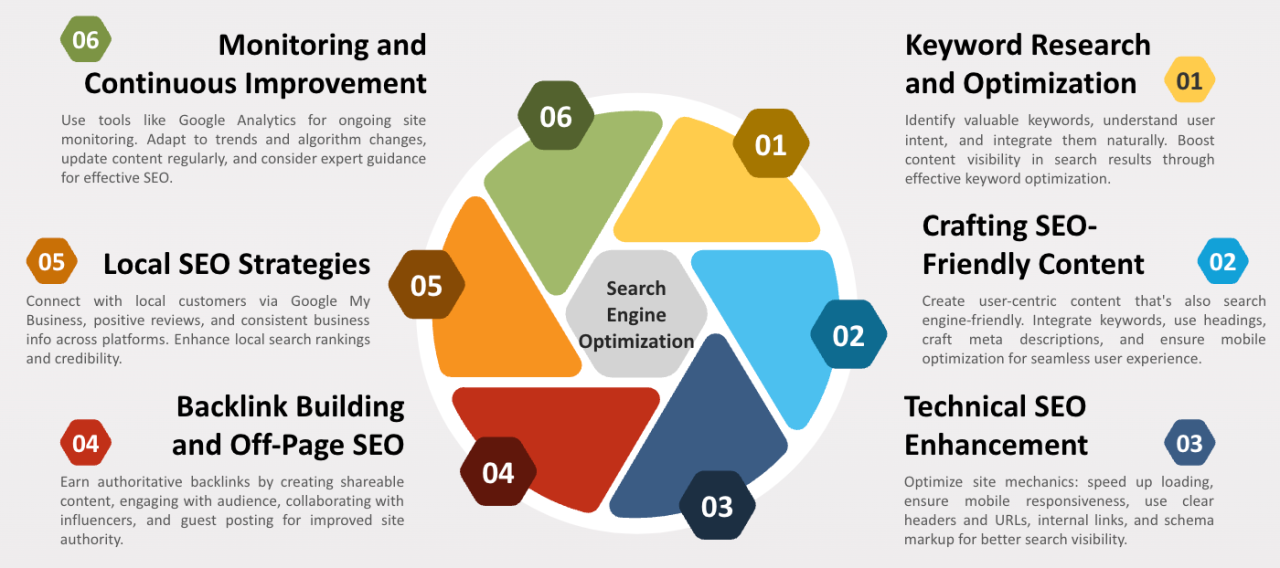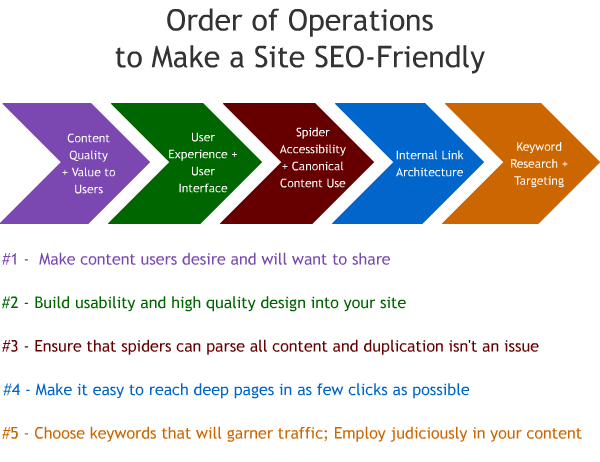![]()
Thank you for reading this post, don't forget to subscribe!
Uncover the secrets of Google’s algorithm and learn how to skyrocket your website’s visibility with these powerful SEO tips.

Image courtesy of via DALL-E 3
Table of Contents
- Introduction: What is SEO and Why Does Google Matter?
- How Google Search Works: The Basics
- Google SEO Optimization: Making Your Website Shine
- Keywords: The Foundation of SEO
- Content is King: Why Quality Matters for Google SEO
- On-Page SEO: Elements Inside Your Website
- Off-Page SEO: Building Your Website’s Reputation
- Technical SEO: Under the Hood Improvements
- Common Mistakes in Google SEO
- Staying Up-to-Date with Google’s Algorithm Changes
- Conclusion: Your Path to SEO Success with Google
Introduction: What is SEO and Why Does Google Matter?
When you search for something on the internet, you probably use a search engine like Google to find the information you need. Have you ever wondered why some websites appear at the top of the search results while others are buried deep down where no one sees them? That’s where Search Engine Optimization, or SEO, comes into play. SEO is like a magic spell that helps websites be more visible and rank higher on search engines like Google.
Understanding SEO
SEO is the art of making your website more attractive to search engines so that they show it to more people. Think of it as a way to make sure your website gets noticed in a sea of other websites. When your website is optimized for search engines, it has a better chance of appearing at the top of search results when someone looks for something related to what you offer.
Google’s Dominance
Google is like the king of all search engines. When someone says they “Googled” something, they mean they searched for it online. Google is where most people go when they need to find information, which is why it’s crucial for websites to pay attention to Google’s preferences. Google sets the rules and standards for how websites should be designed and organized to be easily found by people searching for answers.
How Google Search Works: The Basics
When you search for something on Google, have you ever wondered how it magically presents you with a list of websites that perfectly match your query? Let’s dive into how Google Search works and uncovers the secrets behind its search results.
Google’s Crawlers
Google uses special software programs called crawlers, also known as spiders or bots, to scour the internet and discover new and updated web pages. These crawlers constantly visit websites, following links from one page to another, to gather information and index the content they find.
Indexing Pages
Once the crawlers collect data from websites, Google stores this information in its vast index, which is like a giant library of web pages. When you type a query into the search bar, Google’s algorithms quickly sift through this index to find the most relevant results to show you.
Google SEO Optimization: Making Your Website Shine
When it comes to making your website stand out on Google, there are specific steps and strategies you can implement to improve its visibility. Let’s dive into some key aspects that can help your website shine in the competitive online world.

Image courtesy of www.linkedin.com via Google Images
Website Structure
Having a well-organized website is crucial for Google SEO optimization. A clear and user-friendly layout not only makes it easier for visitors to navigate your site but also helps search engine crawlers understand your content better. Make sure to categorize your content into relevant sections and use clear menu structures to guide users around your website seamlessly.
Mobile Friendliness
In today’s digital age, having a mobile-responsive website is no longer an option—it’s a necessity. With more people accessing the internet on their smartphones and tablets, Google prioritizes mobile-friendly websites in its search rankings. Ensure that your website is optimized for various screen sizes and devices to provide a smooth and enjoyable browsing experience for all users.
Keywords: The Foundation of SEO
So, what exactly are keywords in the realm of SEO? Well, think of keywords as the secret code that unlocks the door to your website. These are the specific words or phrases that people type into search engines like Google when they’re looking for something. By incorporating the right keywords into your website, you can make it easier for search engines to find and rank your site.
Choosing the Right Keywords
When it comes to selecting keywords for your website, it’s essential to choose ones that are not only relevant to your content but also popular among users. Imagine you have a website selling delicious cupcakes. You’d want to use keywords like “best cupcakes near me” or “yummy cupcake flavors” because these are the terms potential customers are likely to search for.
Keyword Placement
Once you’ve identified the perfect keywords for your website, the next step is to strategically place them throughout your content. This means including your chosen keywords in your titles, headings, and the body of your text. By doing this, you’re signaling to search engines like Google that your site is a top match for users searching for those specific keywords.
Content is King: Why Quality Matters for Google SEO
When it comes to Google SEO, the quality of your content plays a crucial role in determining your website’s ranking on search engine results pages. Google values content that is informative, engaging, and relevant to users’ search queries. By creating high-quality content that is tailored to your target audience’s needs, you can increase your chances of ranking higher in search results.

Image courtesy of blog.hubspot.com via Google Images
Content Freshness
Another key factor in Google SEO is the freshness of your content. Google prefers websites that are regularly updated with new and relevant information. By consistently adding fresh content to your site, you signal to Google that your website is active and provides up-to-date information to users. This can help boost your SEO rankings and attract more organic traffic to your site.
On-Page SEO: Elements Inside Your Website
When it comes to on-page SEO, titles and headings play a crucial role in helping Google understand what your content is about. By using relevant keywords in your titles and headings, you can improve your website’s visibility in search results. Make sure your titles and headings are descriptive, concise, and accurately represent the content on the page.
Meta Descriptions
Meta descriptions are the brief snippets of text that appear below the title of a page in search results. These descriptions provide users with a preview of what they can expect to find on your website. It’s important to write compelling meta descriptions that entice users to click through to your site. Including relevant keywords in your meta descriptions can also help improve your site’s SEO.
Off-Page SEO: Building Your Website’s Reputation
Backlinks are like recommendations from other websites to yours. When a reputable site links back to your content, it signals to Google that your website is valuable and trustworthy. Think of it as the more references you have from credible sources, the more authority you gain in Google’s eyes. It’s not just about quantity; quality matters too. Getting backlinks from popular, relevant sites in your industry carries more weight than random websites.

Image courtesy of www.linkedin.com via Google Images
Social Signals
Social media plays a crucial role in boosting your website’s SEO. When your content gets shared, liked, or commented on social platforms, it sends signals to search engines that people find your content interesting and engaging. This social proof can positively impact your website’s ranking. It’s essential to be active on social media platforms, engage with your audience, and create shareable content to increase your website’s visibility and credibility.
Technical SEO: Under the Hood Improvements
Site speed plays a critical role in determining how well your website ranks on Google. When a website loads quickly, users are more likely to stay and engage with your content. Google’s algorithm also takes into account site speed as a ranking factor. A slow-loading website can result in higher bounce rates and lower search engine rankings. To improve site speed, you can optimize images, minify CSS and JavaScript code, and leverage browser caching.
Mobile Optimization
With the increasing number of users accessing websites on mobile devices, it’s essential to have a site that is optimized for mobile. Google gives preference to mobile-friendly sites in its search results, making mobile optimization a crucial aspect of SEO. Responsive design, which allows your website to adapt to different screen sizes, is key to providing a seamless experience for mobile users. Ensuring that your site is mobile-friendly can help improve your visibility on Google and attract more traffic.
Common Mistakes in Google SEO
One common mistake in Google SEO is overusing keywords on your website. You might think that using a lot of keywords will help your site rank higher in search results, but that’s not the case. This practice, known as ‘keyword stuffing,’ can actually harm your SEO efforts. Search engines like Google are smart enough to recognize when keywords are being used unnaturally or excessively. It’s important to use keywords strategically and naturally within your content to improve your visibility without risking penalization.

Image courtesy of neilpatel.com via Google Images
Ignoring Analytics
Another mistake many website owners make is ignoring the valuable data provided by analytics tools. Analytics can give you insights into how visitors are interacting with your site, which pages are most popular, and where improvements can be made. By not paying attention to this information, you could be missing out on opportunities to optimize your site for better SEO performance. Regularly monitoring and analyzing your website’s analytics can help you make informed decisions to improve your site’s visibility and performance in search results.
Staying Up-to-Date with Google’s Algorithm Changes
Google is constantly fine-tuning its search algorithm to provide more accurate and relevant results to users. As a website owner, it’s crucial to stay flexible and adaptable to these changes. What worked well in SEO yesterday might not be as effective today. By staying informed and willing to adjust your strategies, you can ensure that your website remains visible and competitive in search engine results.
Resources for Keeping Informed
There are various resources available to help you stay up-to-date with Google’s algorithm changes. One of the best ways is to follow Google’s official webmaster blog, where they often announce updates and provide insights into how they can impact search results. Additionally, reputable SEO news websites and forums can be valuable sources of information and discussion on the latest trends and changes in the industry.
Conclusion: Your Path to SEO Success with Google
After learning about the ins and outs of SEO and Google’s crucial role in online visibility, you are now equipped with the knowledge to maximize your website’s potential. By implementing the strategies discussed in this guide, you can elevate your site’s ranking on Google and attract more visitors.
Remember, SEO is all about understanding what users are searching for and delivering high-quality, relevant content that meets their needs. By focusing on creating valuable content, optimizing your website structure, and staying current with Google’s algorithm changes, you can set yourself up for success in the dynamic world of SEO.
Choose your keywords wisely, place them strategically throughout your site, and keep your content fresh and engaging. By following these principles, you can increase your site’s visibility on Google and drive organic traffic to your pages.
Don’t forget the importance of off-page SEO as well. Building backlinks from reputable sources and engaging with your audience on social media can further boost your site’s reputation and visibility in search engine results.
Lastly, stay informed and adaptable. SEO is constantly evolving, and Google regularly updates its algorithms. By staying up-to-date with the latest trends and changes, you can stay ahead of the competition and continue to improve your website’s SEO performance.
So, what are you waiting for? Start applying these SEO strategies today and watch your website climb the search engine rankings. With dedication, persistence, and a thorough understanding of SEO principles, you can achieve success with Google and drive more traffic to your site. Good luck on your SEO journey!
Get Your Free SEO Report Now.
Brought to you by StoreAndHost GET YOUR SEO-REPORT
About us and this blog
We are a digital marketing company with a focus on helping our customers achieve great results across several key areas.
Request a free quote
We offer professional SEO services that help websites increase their organic search score drastically in order to compete for the highest rankings even when it comes to highly competitive keywords.
Subscribe to our newsletter!
More from our blog
See all postsRecent Posts
- Boost Your Pagerank with Proven SEO Tips April 2, 2024
- SEO Cheat Sheet: Top Google Tips April 2, 2024
- Boost Sales with Google SEO Optimization April 2, 2024










